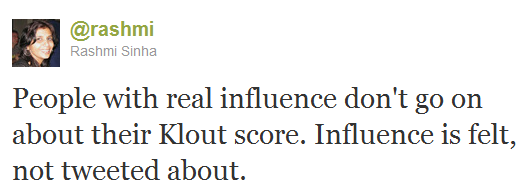 Online influence measurement tool – Klout – announced an update to how they measure Klout scores today.
Online influence measurement tool – Klout – announced an update to how they measure Klout scores today.
For those of you unfamiliar with Klout, it’s a San Francisco-based company that tracks influencers and their impact through links, and recommendation on services like Twitter, Facebook, LinkedIn, Foursquare, etc.
From their post earlier today on their recent changes to their algorithm:
Today we’re releasing a new scoring model with insights to help you understand changes in your influence. This project represents the biggest step forward in accuracy, transparency and our technology in Klout’s history. Joe shared the full vision behind these changes in his post last week.
Influence is the ability to drive action and is based on quality, not quantity. When someone engages with your content, we assess that action in the context of the person’s own activity. These principles form the basis of our PeopleRank algorithm which determines your Score based on:
- how many people you influence,
- how much you influence them and
- how influential they are.
A majority of users will see their Scores stay the same or go up but some users will see a drop. In fact, some of our Scores here at the Klout HQ will drop — our goal is accuracy above all else. We believe our users will be pleased with the improvements we’ve made.
People are upset about their Klout score dropping. They’re upset about who Klout says they “influence.” It’s quite funny actually the extent to which some people let a software company influence/impact their perceived worth.
To them, I respond:
I couldn’t agree more with these Tweets. Instead of obsessing over your Klout score and perceived worth on what an algorithm says, here are some things you can and SHOULD measure instead…
- How many people are getting exposed to your ideas? Measured in subscribers, shares, etc. “Do Epic Shit” has been one of the most shared posts this year and led to several new subscribers when it was first published.
- How many people are downloading your stuff? In Treehouses is an online magazine that measures downloads in Tweets, payments per edition or email subscribers.
- Are you appearing in search results for important phrases? (Google IDX Best Practices and Diverse Solutions is the number 1 result – that’s a win).
- How many testimonials (solicited or un-solicited) have you received in the last month or two? Remember, what others say about you matters more than what you say about yourself.
- How many word of mouth referrals have you received in the last month?
- How many sales have you made in the last month? Are you reaching your monthly/quarterly goals?
Klout Scores don’t sell houses. People don’t buy your product or service because you have Klout. They buy it based on the recommendations (testimonials) of others.
My point? Focus on measuring things that matter…things that move your business goals forward. Not some algorithm that says your “online influence” score is 55/100.
What say you?





